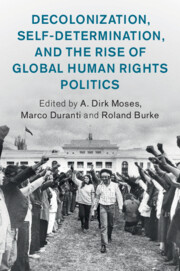Book contents
- Decolonization, Self-Determination, and the Rise of Global Human Rights Politics
- Human Rights in History
- Decolonization, Self-Determination, and the Rise of Global Human Rights Politics
- Copyright page
- Contents
- Notes on Contributors
- Acknowledgments
- Introduction
- Part I Anti-Colonial Struggles and the Right to Self-Determination
- Part II Postcolonial Statehood and Global Human Rights Norms
- Part III Colonial and Neocolonial Responses
- 11 The Inventors of Human Rights in Africa
- 12 “A World Made Safe for Diversity”
- 13 Between Humanitarian Rights and Human Rights
- 14 The End of the Vietnam War and the Rise of Human Rights
- 15 Decolonizing the Geneva Conventions
- 16 Liberté sans Frontières, French Humanitarianism, and the Neoliberal Critique of Third Worldism
- Index
14 - The End of the Vietnam War and the Rise of Human Rights
from Part III - Colonial and Neocolonial Responses
Published online by Cambridge University Press: 24 June 2020
- Decolonization, Self-Determination, and the Rise of Global Human Rights Politics
- Human Rights in History
- Decolonization, Self-Determination, and the Rise of Global Human Rights Politics
- Copyright page
- Contents
- Notes on Contributors
- Acknowledgments
- Introduction
- Part I Anti-Colonial Struggles and the Right to Self-Determination
- Part II Postcolonial Statehood and Global Human Rights Norms
- Part III Colonial and Neocolonial Responses
- 11 The Inventors of Human Rights in Africa
- 12 “A World Made Safe for Diversity”
- 13 Between Humanitarian Rights and Human Rights
- 14 The End of the Vietnam War and the Rise of Human Rights
- 15 Decolonizing the Geneva Conventions
- 16 Liberté sans Frontières, French Humanitarianism, and the Neoliberal Critique of Third Worldism
- Index
Summary
This chapter surveys the South African state’s engagement with the international normative languages which emerged after 1945. Its focus is on the sustained effort to reconfigure apartheid into a form compatible with the lexicon of human rights, self-determination, and multicultural pluralism. Beginning in the early 1960s, apartheid, rebadged “separate development,” was interlaced with norms on self-determination, identity, and economic development. Apartheid was reset in a form which deferred to the prevailing ideals of the period, an effort that was never convincing, but was, in broad terms, disturbingly coherent. Drawing on South African archives and underutilized public relations tracts, it demonstrates that National Party ideologues were conversant in the new internationalist phraseology. Their agility remains a powerful example of how discourses of human welfare and freedom hold ample capacity for subversion into authoritarian instrument. Apartheid, a project of essentialist, racially determined nationalism, could be, and was, translated into various emancipatory and internationalist dialects.
- Type
- Chapter
- Information
- Publisher: Cambridge University PressPrint publication year: 2020



